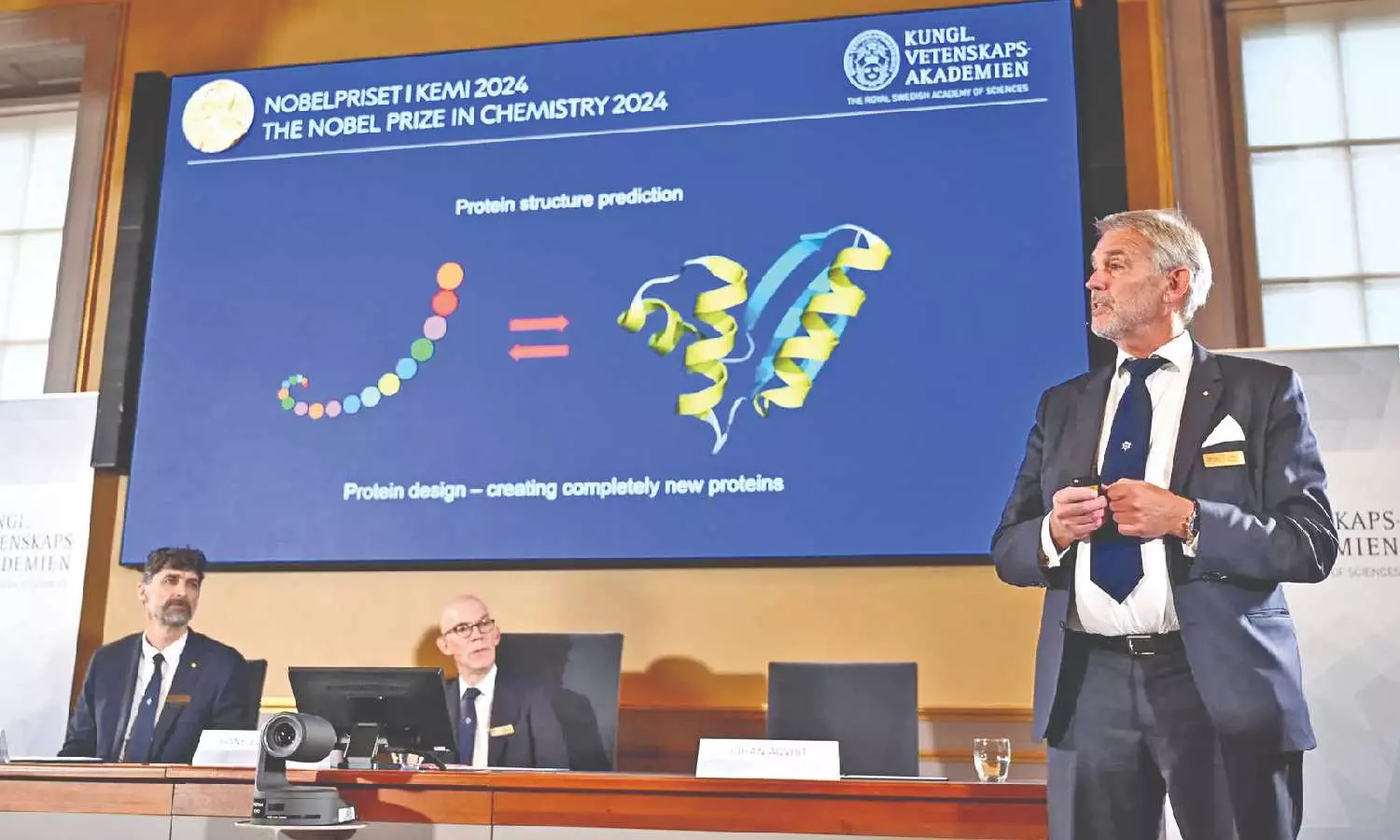Cautious Optimism: Google triumphs on the Nobel stage but..
On Wednesday, the Nobel Prize committee conferred considerable prestige to Google’s pursuit of big ideas.;

Image from the Nobel Prize 2024
Cade Metz, Steve Lohr and David McCabe
Google, thanks to the tens of billions of dollars it makes every year from its online search business, has long pursued giant research projects that could one day change the world.
On Wednesday, the Nobel Prize committee conferred considerable prestige to Google’s pursuit of big ideas. Demis Hassabis, the chief executive of Google’s primary artificial intelligence lab, and John Jumper, one of the lab’s scientists, were among a trio of researchers who received the Nobel Prize in Chemistry for their efforts to better understand the human body and fight disease through AI.
The two Google scientists won their Nobels a day after Geoffrey Hinton, a former Google vice president and researcher, was one of two winners of the Nobel Prize in Physics for his pioneering work on artificial intelligence.
The Nobel wins were a demonstration of the growing role AI is playing in areas far beyond the traditional world of the high-tech industry, and were a reminder of Silicon Valley’s influence in nearly every corner of science and the economy. “This is the year the Nobel committee got AI,” said Oren Etzioni, a professor emeritus of computer science at the University of Washington. “These prizes are a conscious recognition of how influential AI has become in the scientific world.”
But the triumphant moment for Google was tempered by concerns that the commercial success that has allowed the company to pursue these long-term projects is under threat by antitrust regulators. The Nobel awards were also a reminder of worries that the tech industry isn’t paying enough attention to the implications of its open-throttled pursuit of building more powerful AI systems. “We might find ourselves in a situation in which not only the solutions but even the questions being asked are actually being provided by the AI,” said Mohammed AlQuraishi, a Columbia University biologist. “It’s going to be very interesting navigating that as scientists and as humans.”
On Tuesday evening, the Justice Department said it could ask a federal court to force Google into breaking off parts of the company or change how it operates in order to eliminate its monopoly in online search.
Google is also facing off with the Justice Department in a Virginia federal court over claims that it broke antitrust laws to dominate the technology that places ads on websites. Closing arguments in that case are expected next month. And on Monday, a federal judge in California ordered Google to let other companies place app stores on its Android operating system for three years as part of a third antitrust case. Google is not the only big tech company getting squeezed by regulators. The Justice Department has also sued Apple, arguing the company makes it tough for customers to ditch its suite of devices and software. The Federal Trade Commission has filed antitrust lawsuits against Meta, saying it snuffed out competition when it bought Instagram and WhatsApp; and Amazon, arguing the company’s practices artificially inflate prices for products online.
As the largest tech companies fight off concerns over monopolist behaviour, they are going all-in on AI — so much so that regulators are arguing that the companies must be reined in now before they use their power to take control of the young market for AI systems. “AI is coming to chemistry and going to Washington,” said Erik Brynjolfsson, director of the Stanford Digital Economy Lab. “You may not be interested in AI but AI is interested in you.”
In its Tuesday court filing, the Justice Department said it believed that any efforts to tame Google’s search monopoly should take into account its ability to “leverage its monopoly power to feed artificial intelligence features.” The Justice Department said it was considering asking the US District Court for the District of Columbia, which in August agreed with the government that Google abused a search monopoly, to take steps to limit Google’s power in the new technology, including allowing websites to opt out of having their content used in the development of Google’s artificial intelligence systems.
The Federal Trade Commission and the Justice Department this year reached a separate deal clearing the way for them to investigate other companies focused on AI development. The Justice Department has opened an inquiry into Nvidia, which makes computer chips essential to the technology, while the FTC will be responsible for investigating Microsoft and its partner, the San Francisco company OpenAI.
In the early 1960s, when computer science was emerging as a field, the standard put down was that any academic discipline that put “science” in its name wasn’t one. A computer, sceptics said, was a mere tool like a test tube or a microscope.
But as the technology has progressed, accelerated by recent advances in artificial intelligence, computer science has become a driving force behind discoveries across the sciences — in astronomy, biology, chemistry, medicine and physics. “Chatbots are how most people know AI, but the technology’s ability to speed scientific discovery is much more important,” Brynjolfsson said.
Dr Hinton, 76, liked to call Dr Hassabis, 48, his “grand-post-doc” since he had overseen the postdoctoral work of the academic who later oversaw Dr Hassabis’s research.
Dr Hassabis also worries AI could cause a range of problems or even threaten humanity if it is not carefully controlled. But he thinks that staying with a company is the best way to make sure its AI doesn’t cause problems.

